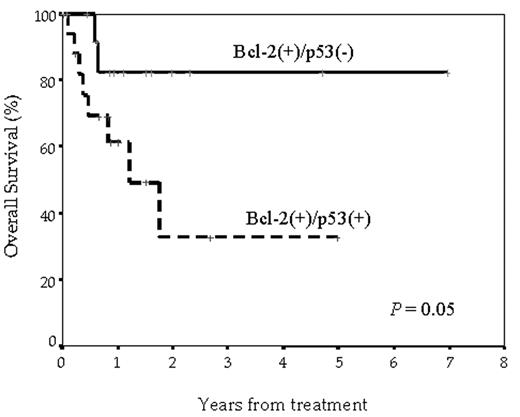Abstract
Introduction: Peripheral T-cell lymphomas (PTCLs) are usually characterized by aggressive and heterogeneous clinical behavior and a poor clinical outcome, plus apoptosis pathways are known to be involved in their pathogenesis. As such, the current study attempted to investigate the overexpression of Bcl-2, Bax, or p53 using an immunohistochemistry method with respect to the expression frequency, different expression patterns according to the histology, and association with the progression of PTCL.
Patients and methods: Paraffin-embedded specimens from 74 patients were analyzed immunohistochemically for Bcl-2, Bax, or p53 overexpression. The enrolled diseases included PTCL-unspecified (PTCL-U; n=45), extranodal natural killer cell/T-cell lymphoma (NK/TL; n=10), angioimmunoblastic T-cell lymphoma (ATL; n=7), anaplastic large cell lymphoma (ALCL; n=7), and cutaneous T-cell lymphoma (CTCL; n=5).
Results: The overexpression of Bcl-2 was exhibited in 33 patients (45%), Bax in 17 patients (23%), and p53 in 33 patients (45%). Bcl-2 overexpression was strongly associated with advanced stage (p=0.021) and higher international prognostic indices (IPI) (p=0.038), and Bax overexpression with advanced stage (p=0.039). For further analysis, the cases were divided into 4 groups according to Bcl-2 and p53 overexpression (Bcl-2−/p53−, Bcl-2−/p53+, Bcl-2+/p53−, and Bcl-2+/p53+), and the Bcl-2+/p53+ group was found to be associated with advanced stage (p=0.008) and higher IPI (p=0.001), plus a lower response rate (p=0.10) compared with the other groups. Meanwhile, when confined to the Bcl-2 overexpressing groups, p53 overexpression was significantly associated with poor survival (p=0.05), as the 3-year OS rate was 82.5±10.2% for the Bcl-2+/p53− cases, yet only 32.9±15.7% for the Bcl-2+/p53+ cases. Multivariate analyses for OS also found the co-expression of Bcl-2/p53 (p=0.004, HR 17.787) as an independent prognostic factor, together with advanced stage (p<0.001, HR 20.090) and higher prognostic index for PTCL (p=0.008, HR 4.212).
Conclusion: Bcl-2 overexpression seemed to correlate with the progression of PTCL. As such, the contribution of the co-overexpression of Bcl-2 and p53 on the poor prognosis of PTCL may imply that a Bcl-2 mediated apoptosis mechanism interacts with a p53-dependent pathway in the progression of PTCL.
The correlation of Bcl-2 and p53 expression with disease progression including stage and international prognostic index
| * Chi-square test was performed the comparison between Bcl-2+/p53+ group and others | |||||
| Stage | IPI | Response | |||
| 1,2 | 3,4 | 0 ~ 2 | 3 ~ 5 | CR/PR | |
| Number of pts (%) | 38 (51) | 36 (49) | 33 (48) | 36 (52) | 43 (75) |
| Bcl-2-/p53- (n=25) | 16 (64) | 9 (36) | 14 (64) | 8 (36) | 16 (80) |
| Bcl-2-/p53+ (n=16) | 10 (63) | 6 (37) | 8 (53) | 7 (47) | 11 (85) |
| Bcl-2+/p53- (n=16) | 8 (50) | 8 (50) | 6 (40) | 9 (60) | 7 (78) |
| Bcl-2+/p53+ (n=17) | 4 (23) | 13 (77) | 5 (29) | 12 (71) | 9 (60) |
| p-value* | 0.08 | 0.01 | 0.10 | ||
| * Chi-square test was performed the comparison between Bcl-2+/p53+ group and others | |||||
| Stage | IPI | Response | |||
| 1,2 | 3,4 | 0 ~ 2 | 3 ~ 5 | CR/PR | |
| Number of pts (%) | 38 (51) | 36 (49) | 33 (48) | 36 (52) | 43 (75) |
| Bcl-2-/p53- (n=25) | 16 (64) | 9 (36) | 14 (64) | 8 (36) | 16 (80) |
| Bcl-2-/p53+ (n=16) | 10 (63) | 6 (37) | 8 (53) | 7 (47) | 11 (85) |
| Bcl-2+/p53- (n=16) | 8 (50) | 8 (50) | 6 (40) | 9 (60) | 7 (78) |
| Bcl-2+/p53+ (n=17) | 4 (23) | 13 (77) | 5 (29) | 12 (71) | 9 (60) |
| p-value* | 0.08 | 0.01 | 0.10 | ||
Author notes
Corresponding author


This feature is available to Subscribers Only
Sign In or Create an Account Close Modal